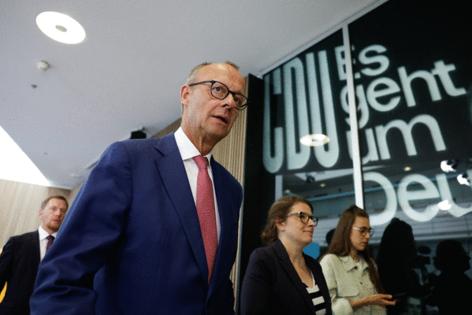Germany's Merz takes aim at Greens in final election stretch
Published in Political News
Conservative frontrunner Friedrich Merz stepped up his attacks on rival Robert Habeck from the Greens as the campaign ahead of Germany’s federal election enters the final stretch.
Merz dismissed Habeck as “a sales person for heat pumps” who wasn’t up for the job of running the German economy, and pledged to appoint someone more qualified, according to local media reports. He was referring to Habeck’s botched attempt as economy minister to draft a law that fosters the replacement of oil-powered heating for homes.
Saturday’s the final day in the three-month campaign before Germans head to the polls, with the candidates having focused their attention on migration and the flagging economy. After two years of stagnation, prospects for a meaningful economic recovery in 2025 are waning because of stubbornly high energy costs, weakening exports to China and Trump’s threat to impose tariffs on European goods.
Germany must regain economic strength, muscle its way out of recession, and take over more responsibility in the European Union again, Merz said. His latest comments on Habeck and the Greens reflect efforts by conservative leaders to win over undecided voters disappointed by the current government. The Greens faced fierce criticism for contentious moves including Habeck’s heat pumps initiative and the decision to shutter Germany’s remaining nuclear power plants despite the country’s energy crunch after Russia cut off gas supplies.
Merz’s conservative CDU/CSU bloc planned to wrap up its election campaign at an event in Munich on Saturday afternoon. Chancellor Olaf Scholz from the Social Democrats will speak at a campaign event in his constituency in Potsdam outside Berlin.
The CDU/CSU bloc was leading in a poll published Saturday by German tabloid Bild and research institute INSA with 29.5% of the votes, followed by the right-wing Alternative for Germany with 21% and the Social Democrats of current chancellor Scholz at 15%. The Greens reached 12.5%.
The numbers are in line with previous surveys, which didn’t move materially in recent weeks.
Merz will need at least one coalition partner to secure a majority in parliament and the SPD and the Greens are his most likely options. However, leaders of the conservative bloc have launched several fierce attacks, particularly on the Green’s candidate Habeck, which might complicate any efforts to find common ground in potential coalition talks.
Depending on the number of smaller parties that clear the 5% threshold for getting seats in the Bundestag, he may be forced into an unwieldy three-party alliance.
Both Merz and Scholz have focused their campaigns on the need for Europe to take on more responsibility for its own security, with signs the US under Donald Trump is pulling back from its commitment to the NATO military alliance.
Protecting Ukraine and expanding their own militaries could cost the continent’s major powers an additional $3.1 trillion over the next 10 years, according to a Bloomberg Economics analysis.
Scholz reiterated his call for a loosening of the debt brake rules to help fund Germany’s modernization “without this being at the expense of healthcare and pensions.”
“These tasks must also be financed through greater leeway in our debt rules — otherwise the country will not hold together and cannot grow,” Scholz said Friday on TV.
The polarizing election campaign could lead to a higher turnout among voters, according political scientist Sarah Strömel from Regensburg University. Voters realize that there’s “a lot stake,” she said in an interview with radio station WDR5.
©2025 Bloomberg L.P. Visit bloomberg.com. Distributed by Tribune Content Agency, LLC.




























































Comments